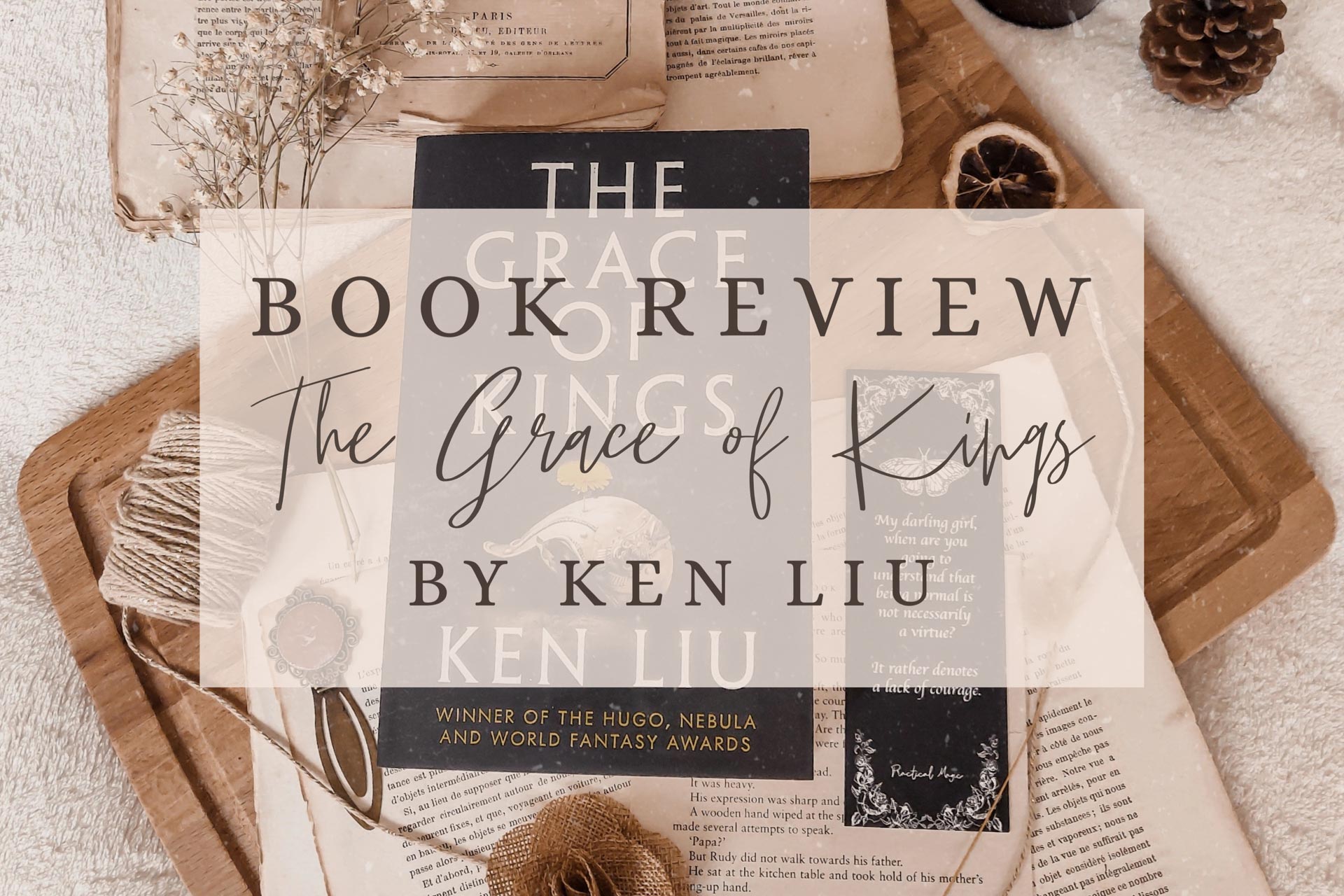
Author: Ken Liu
Publisher: Saga Press
Genre: Historical Fantasy
Release date: April 7th, 2015
Pages: 640
Goodreads page: here
TW: death, violence, wars
My rating: 4.5/5 ⭐
Publisher: Saga Press
Genre: Historical Fantasy
Release date: April 7th, 2015
Pages: 640
Goodreads page: here
TW: death, violence, wars
My rating: 4.5/5 ⭐
Synopsis
Two men rebel together against tyranny—and then become rivals—in this first sweeping book of an epic fantasy series from Ken Liu, recipient of Hugo, Nebula, and World Fantasy awards.
Wily, charming Kuni Garu, a bandit, and stern, fearless Mata Zyndu, the son of a deposed duke, seem like polar opposites. Yet, in the uprising against the emperor, the two quickly become the best of friends after a series of adventures fighting against vast conscripted armies, silk-draped airships, and shapeshifting gods. Once the emperor has been overthrown, however, they each find themselves the leader of separate factions—two sides with very different ideas about how the world should be run and the meaning of justice.
Fans of intrigue, intimate plots, and action will find a new series to embrace in the Dandelion Dynasty.
My thoughts
Let's try to review this big boy. Well, where do I start? I feel like I have so many feelings and thoughts about this book that I don't know where to start. I don’t often feel the need to write a review of a book only a few hours after finishing it, but I couldn’t stop thinking about this one so, let's try with the beginning.
The writing of Ken Liu instantly grabbed me and left me in awe of such beautiful and poetic writing. When I started this book, I didn't quite know what to expect besides the fact that it was inspired by Ancient Chinese history and known as an epic fantasy story. So, the beautiful writing was a surprise, and honestly this kind of writing is truly my favorite. The words swept me in a whole new world of culture and world-building, and I could just let myself float in this river of a graceful voice telling me a fascinating historical story.
“The most interesting thing is often not the easiest thing. There may be pain and suffering, disappointment and failure, for yourself and those you love. But without having endured bitterness, I don’t believe one will treasure sweetness as heartily as one should.”At first, I was pretty overwhelmed and unsettled by this book. It was unlike anything I had ever read before, with an omniscient narrator, jumping from character to character -and there were many characters-, telling the story of each character and their actions in a short narrative, with the purpose of forming a bigger picture of this complex, divided world. Even if I was enjoying the writing, and was curious about the story, it took me a few chapters to get used to this novel structure. Here I was, expecting a new fantastic epic fantasy story, and I was, in the end, delivered a classic history book. Well, not quite really an history book, because there was so much more to it, but it made me think a lot about it with its structure.
“There’s never going to be an end to suffering if ‘he deserves it’ is all the justification people need for inflicting pain.”I complained a lot at first, that this was clearly not a character-driven story, and that the characters lacked in depth and development, but I completely changed my mind by the end of the book. While some characters’ perspectives were indeed not well developed, they had each of them a background story, may it be really short for some of them and longer for others. With the omniscient narrator jumping from characters to characters, it felt like we didn't have time to get attached or connect to them, but while some characters were indeed just passing and disappeared quickly, others stayed through the entire book and came back often with every time a bit more depth and development to them. And that's how I fell in love with Kuni Garu, Mata Zyndu and Jia Matiza. Their relationships were really well developed and touching, and left me on the verge of tears by the end of this book.
“The grace of kings is not the same as the morals governing individuals.”Some of the characters felt almost like caricatures in a kind of satirical novel, and it added a lot of humor to the story. What I really liked about in this story though, was that there were no hero nor villain, and almost all of them were morally grey characters. Even the Emperor Mapidéré, who was on an Imperial tour on the islands in the prologue of the book, who unified all the kingdoms of the Dara Islands through wars with a purpose of a peaceful kingdom - after decades of wars between the old and divided lands-, and which turned slowly into tyranny.
“What is fate but coincidences in retrospect?”What I enjoyed the most about this book though, was the historical elements of this story. The Grace of Kings was a story full of wars, revolutions, military strategy and politics, and was 100% based on the fall of the Qin dynasty and the beginning of the Han dynasty which started in 206 BC, so a very long time ago. The Han dynasty was the second great Imperial dynasty of China and I found it fascinating to learn about all the twists and turns of the wars and revolutions that occurred, and how the Han dynasty came into power. However, I thought that the premise of this book was wrongly sold in my opinion. To me, this book didn’t feel like epic fantasy at all, and more as historical fiction / historical retelling. The only fantasy part of this book were the mentions and the presence of the gods, watching the wars from above with interest and that was like 5% of the whole story. So, I would strongly suggest to no start this book expecting an epic fantasy like we’re used to, but mostly an historical fiction with an open-mind on the rare pieces of fantasy elements.
“I refuse to believe in the futility of change, because I have seen how the lowly dandelion, with time and patience, can crack the strongest paving stone.”So much was going on in the plot that it felt pretty fast-paced and very intriguing, but some characters background stories also slowed the pace in some parts of the book, and I found that it was perfectly balanced. I was often in awe of this intelligent and complex story, and how all the pieces connected into the bigger picture of this divided world and I really enjoyed the mix of Chinese aesthetics and ancient military strategy with the use of modern Eastern techniques such as airships and kites. Despite the fact that this book was about wars and revolutions, I didn’t find this book violent at all. There were some violent scenes, of course, and lots of death, but it was told in a form of detachment, cold and distant way that it wasn’t really shocking nor disgusting. This book was also so intelligent and fascinating, talking about morals, faith, trust and power and there were many, many, quotes that I will cherish for a long time.
“The right path is not revealed to us by the gods or ancient sages, but must be found by ourselves through experimentation. You are uncertain, and in your uncertainty you will always seek to ask questions rather than believing yourself to possess all the answers. An ant who rides a dandelion seed will land wherever the seed lands. Men of talent will be judged in the light of the legacies of those they served.”One point that I would like to talk about was the lack of women characters in this story. It bothered me, but it didn’t really surprise me given the inspiration and influence of the Ancient war history used here. I say that it didn’t really surprise me here but, in a way, it could have since this book was released in 2015. For the good first half of this book, or even first 70% of the book I’d say, the wife of one of the main characters was the only “important” female character. There were, of course, mentions of women in the story, such as mothers, wives, prostitutes, dancers, but there was nothing more than that. However, despite a strong and traditionally misogynistic world, the author made the effort of questioning it. The narrative didn’t support misogyny and in the last third of the book, more important and amazing female characters appeared. This aspect of the book wasn’t perfect at all, but I saw the effort and it didn’t ruin my reading journey.
Overall, this book surprised me in many ways. I absolutely loved the beautiful and poetic writing with the historical plot and setting, I enjoyed more than I thought the chosen structure of this novel and its characters, and the ending left me in awe and with a sadness that I could not explain. I will not forget this book anytime soon. It was unlike anything I had ever read before; it was definitely unusual but so well written and fascinating, and I will clearly pick up the sequel soon.




















